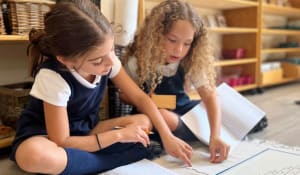 In this case, it has to do with the pedagogy each has elected to use.
In this case, it has to do with the pedagogy each has elected to use.
The first teacher relies on poorly carried out, teacher-centered lectures and is unable to move away from the textbook; the second uses her students' interests, emotions, and abilities to guide her lesson planning. She is engaging her students in their instruction.
When we talk about teaching for the 21st century, we are talking about two things. To teach for the future is to use the most current technologies as part of your classroom routine. But our two teachers have access to the same technology. In this case, the second teacher is teaching for the 21st Century through better understanding of pedagogy–through engaging her students.
The concept of engaging students looks at teaching and learning through a slightly different lens than traditional teaching. The focus is on student understanding, rather than on material covered. The teacher might focus on specific themes and concepts and give students time to explore them through research, experimentation, and real-world projects rather than by having the text drive her teaching . The curriculum that covers a lot of information in a unit of study is referred to as "a mile wide and an inch deep." Curriculum that engages students looks to reduce the factual information presented in an effort to deepen student understanding of the essential elements the teacher wants the students to learn.
When engaging students, the teacher wants to keep the student at the heart of planning.
Any activity is only as valuable as the challenge and effort it forces students to bring to the topic being studied. The goal is always for students to discover elements of the curriculum that will help them draw conclusions, create context, and see relationships among the elements of the unit at hand. If we find an activity that is interesting or "fun," but not intellectually engaging enough for what we want for our students, then the activity isn't worth the class time it will take. This is as true in preschool as it is in upper school.
Relevance is multifaceted. It can refer to solving real-world problems as a way of connecting to students' interests and problem-solving skills, or to enabling students to discover the interconnectedness of concepts within the unit of study. It can mean tapping into students' emotions as a means of relating to the material, or discussing the various approaches to achieving resolution to a situation at hand, and evaluating each one before a group decides on a course of action. Relevance can refer to the material being presented, the students' needs, or the activities being assigned.
Before students can start to understand connections, they must have time to reflect. They should be asked to reflect on what is being studied, on the structure of the unit as it is being presented to them, on related units of study previously taught in the same discipline or even in other disciplines, on real-world applications for what is being studied, and on how the understandings gained might be of benefit to them personally or, at some point, professionally. Reflection allows for synthesizing data and concepts so that the student can see relevance and rigor in a broader context.
Author Robyn R. Jackson says that teachers should never work harder than their students. The truth is that teachers have to work just as hard by devising instruction that makes students do more than listen and take notes. Students should be working to create meaning and context within a unit of study through a variety of activities and assignments. They should be trying to use the unit a teacher plans to help himself or herself answer the basic questions that make the topic meaningful. They should be using their interests and abilities to guide their learning.
Some strategies a teacher might employ in engaging students include:
- sharing unit and lesson objectives with students
- focusing on essential questions
- developing metacognitive skills
- planning for review, presenting new material and reflection in every lesson
- engaging students' affective realm (emotions, opinions, responses)
- allowing students to work cooperatively and collaboratively
- giving students choices and decision-making opportunities throughout the unit of study
- using graphic organizers to help students visualize connections and build content-specific vocabulary
- devising real-world assessments
- differentiating instruction
In teaching for the 21st Century, we want to make students accountable for their learning by involving them in the curriculum through discovery and interpretation. The focus for the teacher is changing from "covering the curriculum" to designing lessons that allow students to uncover it. By allowing students to use their understandings to solve problems, we are teaching them to use information and cooperation as tools for fostering critical thinking.





 In this case, it has to do with the pedagogy each has elected to use.
In this case, it has to do with the pedagogy each has elected to use.















